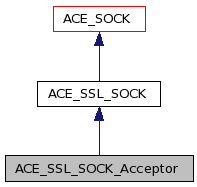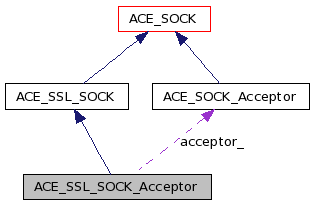Defines a factory that creates new ACE_SSL_SOCK_Stream objects passively.
More...
#include <SSL_SOCK_Acceptor.h>


Public Types | |
| typedef ACE_INET_Addr | PEER_ADDR |
| Meta-type info. | |
| typedef ACE_SSL_SOCK_Stream | PEER_STREAM |
| Meta-type info. | |
Public Member Functions | |
| ACE_SSL_SOCK_Acceptor (void) | |
| Default constructor. | |
| ~ACE_SSL_SOCK_Acceptor (void) | |
| Default destructor. | |
| ACE_SSL_SOCK_Acceptor (const ACE_Addr &local_sap, int reuse_addr=0, int protocol_family=PF_UNSPEC, int backlog=ACE_DEFAULT_BACKLOG, int protocol=0) | |
| ACE_SSL_SOCK_Acceptor (const ACE_Addr &local_sap, ACE_Protocol_Info *protocolinfo, ACE_SOCK_GROUP g, u_long flags, int reuse_addr, int protocol_family=PF_UNSPEC, int backlog=ACE_DEFAULT_BACKLOG, int protocol=0) | |
| int | open (const ACE_Addr &local_sap, int reuse_addr=0, int protocol_family=PF_UNSPEC, int backlog=ACE_DEFAULT_BACKLOG, int protocol=0) |
| int | close (void) |
| Close the listening socket. | |
Passive Connection "accept" Methods | |
| int | accept (ACE_SSL_SOCK_Stream &new_stream, ACE_Addr *remote_addr=0, ACE_Time_Value *timeout=0, bool restart=true, bool reset_new_handle=false) const |
| int | accept (ACE_SSL_SOCK_Stream &new_stream, ACE_Accept_QoS_Params qos_params, ACE_Addr *remote_addr=0, ACE_Time_Value *timeout=0, bool restart=true, bool reset_new_handle=false) const |
Public Attributes | |
| ACE_ALLOC_HOOK_DECLARE | |
| Declare the dynamic allocation hooks. | |
Protected Member Functions | |
| int | ssl_accept (ACE_SSL_SOCK_Stream &new_stream, ACE_Time_Value *timeout) const |
| Complete SSL passive connection establishment. | |
Private Attributes | |
| ACE_SOCK_Acceptor | acceptor_ |
| The BSD-socket workhorse. | |
Defines a factory that creates new ACE_SSL_SOCK_Stream objects passively.
The ACE_SSL_SOCK_Acceptor has its own ACE_SOCK_Acceptor which handles the basic socket acceptance. This class is a wrapper which adds the SSL acceptance handshake handling. Since SSL is record oriented, some additional steps must be taken after the basic socket acceptance to complete the SSL handshake that takes place at session establishment.
Definition at line 51 of file SSL_SOCK_Acceptor.h.
Meta-type info.
Definition at line 169 of file SSL_SOCK_Acceptor.h.
Meta-type info.
Definition at line 170 of file SSL_SOCK_Acceptor.h.
| ACE_SSL_SOCK_Acceptor::ACE_SSL_SOCK_Acceptor | ( | void | ) |
Default constructor.
Definition at line 8 of file SSL_SOCK_Acceptor.inl.
| ACE_SSL_SOCK_Acceptor::~ACE_SSL_SOCK_Acceptor | ( | void | ) |
Default destructor.
| ACE_SSL_SOCK_Acceptor::ACE_SSL_SOCK_Acceptor | ( | const ACE_Addr & | local_sap, | |
| int | reuse_addr = 0, |
|||
| int | protocol_family = PF_UNSPEC, |
|||
| int | backlog = ACE_DEFAULT_BACKLOG, |
|||
| int | protocol = 0 | |||
| ) |
Initiate a passive mode SSL/BSD-style acceptor socket.
| local_sap | The address that we're going to listen for connections on. If this is ACE_Addr::sap_any, this socket listens on an the "any" IP address and selects an unused port. To find out what port was selected, call this object's ACE_SOCK::get_local_addr(ACE_Addr&) method upon return. |
Definition at line 15 of file SSL_SOCK_Acceptor.inl.
: acceptor_ (local_sap, reuse_addr, protocol_family, backlog, protocol) { ACE_TRACE ("ACE_SSL_SOCK_Acceptor::ACE_SSL_SOCK_Acceptor"); this->set_handle (this->acceptor_.get_handle ()); }
| ACE_SSL_SOCK_Acceptor::ACE_SSL_SOCK_Acceptor | ( | const ACE_Addr & | local_sap, | |
| ACE_Protocol_Info * | protocolinfo, | |||
| ACE_SOCK_GROUP | g, | |||
| u_long | flags, | |||
| int | reuse_addr, | |||
| int | protocol_family = PF_UNSPEC, |
|||
| int | backlog = ACE_DEFAULT_BACKLOG, |
|||
| int | protocol = 0 | |||
| ) |
Initiate a passive-mode QoS-enabled acceptor socket.
| local_sap | The address that we're going to listen for connections on. If this is ACE_Addr::sap_any, this socket listens on an the "any" IP address and selects an unused port. To find out what port was selected, call this object's ACE_SOCK::get_local_addr(ACE_Addr&) method upon return. |
Definition at line 32 of file SSL_SOCK_Acceptor.inl.
: acceptor_ (local_sap, protocolinfo, g, flags, reuse_addr, protocol_family, backlog, protocol) { ACE_TRACE ("ACE_SSL_SOCK_Acceptor::ACE_SSL_SOCK_Acceptor"); this->set_handle (this->acceptor_.get_handle ()); }
| int ACE_SSL_SOCK_Acceptor::accept | ( | ACE_SSL_SOCK_Stream & | new_stream, | |
| ACE_Addr * | remote_addr = 0, |
|||
| ACE_Time_Value * | timeout = 0, |
|||
| bool | restart = true, |
|||
| bool | reset_new_handle = false | |||
| ) | const |
Accept a new ACE_SSL_SOCK_Stream connection. On successful return, the socket has been accepted and the SSL handshake has been completed.
| new_stream | The ACE_SSL_SOCK_Stream object that will receive the new SSL socket. | |
| remote_addr | Pointer to an ACE_INET_Addr object that will receive the address of the peer that connected. | |
| timeout | The maximum time to wait for the combined socket acceptance and handshake completion. 0 means block forever, a timeout of {0, 0} means poll. | |
| restart | 1 means "restart if interrupted," that is, if errno == EINTR. |
Definition at line 176 of file SSL_SOCK_Acceptor.cpp.
{
ACE_TRACE ("ACE_SSL_SOCK_Acceptor::accept");
// Take into account the time to complete the basic TCP handshake
// and the SSL handshake.
ACE_Countdown_Time countdown (timeout);
ACE_SOCK_Stream temp_stream;
if (-1 == this->acceptor_.accept (temp_stream,
remote_addr,
timeout,
restart,
reset_new_handle))
return -1;
(void) countdown.update ();
new_stream.set_handle (temp_stream.get_handle ());
temp_stream.set_handle (ACE_INVALID_HANDLE);
if (this->ssl_accept (new_stream, timeout) == -1)
{
new_stream.close ();
new_stream.set_handle (ACE_INVALID_HANDLE);
return -1;
}
return 0;
}
| int ACE_SSL_SOCK_Acceptor::accept | ( | ACE_SSL_SOCK_Stream & | new_stream, | |
| ACE_Accept_QoS_Params | qos_params, | |||
| ACE_Addr * | remote_addr = 0, |
|||
| ACE_Time_Value * | timeout = 0, |
|||
| bool | restart = true, |
|||
| bool | reset_new_handle = false | |||
| ) | const |
Accept a new ACE_SSL_SOCK_Stream connection using the RVSP QoS information in qos_params.
| new_stream | The ACE_SSL_SOCK_Stream object that will receive the new SSL socket. | |
| remote_addr | Pointer to an ACE_INET_Addr object that will receive the address of the peer that connected. | |
| timeout | The maximum time to wait for the combined socket acceptance and handshake completion. 0 means block forever, a timeout of {0, 0} means poll. | |
| restart | 1 means "restart if interrupted," that is, if errno == EINTR. |
Definition at line 213 of file SSL_SOCK_Acceptor.cpp.
{
ACE_TRACE ("ACE_SSL_SOCK_Acceptor::accept");
// Take into account the time to complete the basic TCP handshake
// and the SSL handshake.
ACE_Countdown_Time countdown (timeout);
ACE_SOCK_Stream temp_stream;
if (-1 == this->acceptor_.accept (temp_stream,
qos_params,
remote_addr,
timeout,
restart,
reset_new_handle))
return -1;
(void) countdown.update ();
new_stream.set_handle (temp_stream.get_handle ());
temp_stream.set_handle (ACE_INVALID_HANDLE);
if (this->ssl_accept (new_stream, timeout) == -1)
{
new_stream.close ();
new_stream.set_handle (ACE_INVALID_HANDLE);
return -1;
}
return 0;
}
| int ACE_SSL_SOCK_Acceptor::close | ( | void | ) |
Close the listening socket.
Reimplemented from ACE_SOCK.
Definition at line 75 of file SSL_SOCK_Acceptor.inl.
{
ACE_TRACE ("ACE_SSL_SOCK_Acceptor::close ()");
int const result = this->acceptor_.close ();
this->set_handle (ACE_INVALID_HANDLE);
return result;
}
| int ACE_SSL_SOCK_Acceptor::open | ( | const ACE_Addr & | local_sap, | |
| int | reuse_addr = 0, |
|||
| int | protocol_family = PF_UNSPEC, |
|||
| int | backlog = ACE_DEFAULT_BACKLOG, |
|||
| int | protocol = 0 | |||
| ) |
Initiate a passive mode SSL/BSD-style acceptor socket.
| local_sap | The address that we're going to listen for connections on. If this is ACE_Addr::sap_any, this socket listens on an the "any" IP address and selects an unused port. To find out what port was selected, call this object's ACE_SOCK::get_local_addr(ACE_Addr&) method upon return. |
Definition at line 55 of file SSL_SOCK_Acceptor.inl.
{
ACE_TRACE ("ACE_SSL_SOCK_Acceptor::open");
if (this->acceptor_.open (local_sap,
reuse_addr,
protocol_family,
backlog,
protocol) != 0)
return -1;
else
this->set_handle (this->acceptor_.get_handle ());
return 0;
}
| int ACE_SSL_SOCK_Acceptor::ssl_accept | ( | ACE_SSL_SOCK_Stream & | new_stream, | |
| ACE_Time_Value * | timeout | |||
| ) | const [protected] |
Complete SSL passive connection establishment.
Definition at line 35 of file SSL_SOCK_Acceptor.cpp.
{
SSL *ssl = new_stream.ssl ();
if (SSL_is_init_finished (ssl))
return 0;
if (!SSL_in_accept_init (ssl))
::SSL_set_accept_state (ssl);
ACE_HANDLE handle = new_stream.get_handle ();
// We're going to call SSL_accept, optionally doing ACE::select and
// retrying the SSL_accept, until the SSL handshake is done or
// it fails.
// To get the timeout affect, set the socket to nonblocking mode
// before beginning if there is a timeout specified. If the timeout
// is 0 (wait as long as it takes) then don't worry about the blocking
// status; we'll block in SSL_accept if the socket is blocking, and
// block in ACE::select if not.
int reset_blocking_mode = 0;
if (timeout != 0)
{
reset_blocking_mode = ACE_BIT_DISABLED (ACE::get_flags (handle),
ACE_NONBLOCK);
// Set the handle into non-blocking mode if it's not already
// in it.
if (reset_blocking_mode
&& ACE::set_flags (handle,
ACE_NONBLOCK) == -1)
return -1;
}
// Take into account the time between each select() call below.
ACE_Countdown_Time countdown (timeout);
int status;
do
{
// These handle sets are used to set up for whatever SSL_accept
// says it wants next. They're reset on each pass around the loop.
ACE_Handle_Set rd_handle;
ACE_Handle_Set wr_handle;
status = ::SSL_accept (ssl);
switch (::SSL_get_error (ssl, status))
{
case SSL_ERROR_NONE:
status = 0; // To tell caller about success
break; // Done
case SSL_ERROR_WANT_WRITE:
wr_handle.set_bit (handle);
status = 1; // Wait for more activity
break;
case SSL_ERROR_WANT_READ:
rd_handle.set_bit (handle);
status = 1; // Wait for more activity
break;
case SSL_ERROR_ZERO_RETURN:
// The peer has notified us that it is shutting down via
// the SSL "close_notify" message so we need to
// shutdown, too.
status = -1;
break;
case SSL_ERROR_SYSCALL:
// On some platforms (e.g. MS Windows) OpenSSL does not
// store the last error in errno so explicitly do so.
//
// Explicitly check for EWOULDBLOCK since it doesn't get
// converted to an SSL_ERROR_WANT_{READ,WRITE} on some
// platforms. If SSL_accept failed outright, though, don't
// bother checking more. This can happen if the socket gets
// closed during the handshake.
if (ACE_OS::set_errno_to_last_error () == EWOULDBLOCK &&
status == -1)
{
// Although the SSL_ERROR_WANT_READ/WRITE isn't getting
// set correctly, the read/write state should be valid.
// Use that to decide what to do.
status = 1; // Wait for more activity
if (SSL_want_write (ssl))
wr_handle.set_bit (handle);
else if (SSL_want_read (ssl))
rd_handle.set_bit (handle);
else
status = -1; // Doesn't want anything - bail out
}
else
status = -1;
break;
default:
ACE_SSL_Context::report_error ();
status = -1;
break;
}
if (status == 1)
{
// Must have at least one handle to wait for at this point.
ACE_ASSERT (rd_handle.num_set() == 1 || wr_handle.num_set () == 1);
status = ACE::select (int (handle) + 1,
&rd_handle,
&wr_handle,
0,
timeout);
(void) countdown.update ();
// 0 is timeout, so we're done.
// -1 is error, so we're done.
// Could be both handles set (same handle in both masks) so
// set to 1.
if (status >= 1)
status = 1;
else // Timeout or failure
status = -1;
}
} while (status == 1 && !SSL_is_init_finished (ssl));
if (reset_blocking_mode)
{
ACE_Errno_Guard eguard (errno);
ACE::clr_flags (handle, ACE_NONBLOCK);
}
return (status == -1 ? -1 : 0);
}
The BSD-socket workhorse.
Definition at line 185 of file SSL_SOCK_Acceptor.h.
Declare the dynamic allocation hooks.
Reimplemented from ACE_SOCK.
Definition at line 174 of file SSL_SOCK_Acceptor.h.
 1.7.0
1.7.0